Letting Jules Verne down: Round the World in Eighty Dishes & its redemptive descendant.
1. Changing times in culinary terms.
In 1950, Elizabeth David published A Book of Mediterranean Food. She followed it fast with French Country Cooking in 1951, Italian Food in 1954 and Summer Cooking in 1955. These and her subsequent efforts became runaway hits in Britain, and ignited a culinary craze for all things exotic. The foods of the warm south eclipsed traditional British cuisine among the British cognoscenti, and their appetites created a ready market for anything that purported to describe foreign foods.
When Round the World in Eighty Dishes appeared in 1956 a path therefore had emerged and the book found an eager audience. It did not hurt matters that its author, Lesley Blanch, herself epitomized exotica, not to say erotica. A fabulist, Blanch imbued her bestseller called The Wilder Shores of Love with a drastic dose of fabrication, which bothered her admirers not at all. It was Blanch’s first book, finished at the age of almost fifty in 1954 and was, according to Alice Wooledge Salmon, “an instant and worldwide success, and has never gone out of print.” (Salmon)
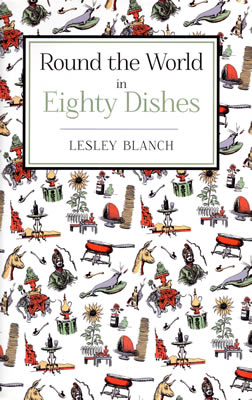
2. An eccentric original.
The Wilder Shores purports to chronicle the lives of four European women “who,” Wooledge Salmon again,
“variously found the ‘heart of adventure’ through headlong love and otherwise in 19th century north Africa and the Near East. In the cascading sentences and florid prose that characterizes her writing, Blanch recreated (detractors would say concocted) history and its atmosphere: a synergy of fact and description, imaginative elan, and the penetration of a sharp and empathetic mind.” (Salmon)
The New York Times reviewer more or less concurred: “In spite of some distressing stylistic excesses, this is a good and an exuberantly colorful book.” (Fox)
Before turning to books Blanch had run away to Corsica with a family friend she later identified only as “The Traveler.” A “Muscovite of Tartar extraction,” he had known her since infancy, then seduced her: It had required little effort on his part. (Salmon) She was seventeen, he was forty-two. Inevitably they parted; Blanch had a taste for affairs. “Did I have adventures with foreign men?” she asked a Times of London reporter on her hundredth birthday, “I did many times because I like them.” (Fox)
On returning to England Blanch enrolled at the Slade, then designed theater sets for a celebrated Russian emigre, illustrated book covers at Faber and went on to British Vogue , where she would become features editor from 1937 until 1944. “During the war,” she recalled, she also “wrote propaganda stuff for the Women’s Services,” which, with its required intermixture of truth and untruth, would have come easily to her. (Guppy 5)
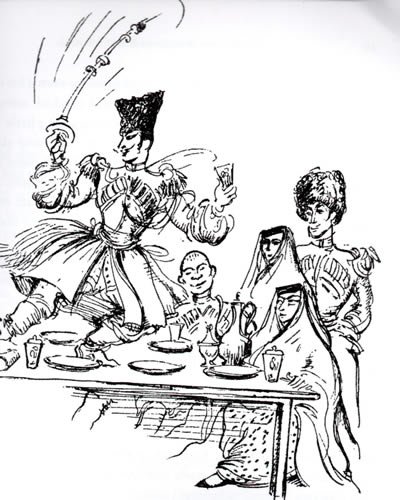
Lesley Blanch’s illustration of Russians at table from Round the World in Eighty Dishes
Russia became an obsession, and between the wars Blanch “was among the very few who ventured across Stalin’s Soviet Union.” (lesleyblanch.com) It is tempting to wonder what the comrades thought about this paradigm of English eccentricity who liked to “travel heavy” with her “creature comforts” including an icon and silver christening mugs for drinking “in remote areas.” (Salmon)
After one or more divorces, Blanch married Romain Gary, a French diplomat and novelist born in Russia. He was “one of the many louche, romanticized and temperamental versions of le bel homme--as fond as she of the grand gesture--for whom she had an explosive and lifelong enthusiasm.” Gary and so Blanch were posted in turn to Paris, Sofia, Berne, New York and Los Angeles; during the course of their marriage Blanch traveled extensively and alone, through the Balkans, Caucasus and Siberia, across the Middle East, to Uzbekistan, Afghanistan, Siberia, India, Yemen, Central America and Mexico. (Salmon; Fox) Blanch would conclude that she did not belong in England and spent the end of her life in France.
The marriage with Gary could not, of course, last; he left “darling self,” Blanch’s self-ascribed name, for Jean Seberg, not the only celebrity in the volatile couple’s social orbit. In a macabre twist, Gary and Seberg independently committed suicide some years later.
3. A difficult magnetism.
In her autobiography Blanch “drops names with reckless abandon;” a weekend in Washington with Malraux or at a party “sitting on a sofa between Edith Sitwell, magnificent in her priestess robes, and Marlene Dietrich in a glittering black sheath. Stretched across our knees was Truman Capote.” (Ziegler; Guppy 27)
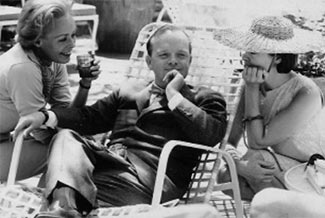 Truman between.
Truman between.
Other friends included Fred Astaire, Cecil Beaton, Charles Boyer, Leslie Caron, Gary Cooper, George Cukor, Aldous Huxley, Sophia Loren, James Mason, Olivier, Cole Porter, David Selznick, Seberg (at least before the breach), John Wayne, whom she “liked very much, despite his ghastly politics”--these from her screenwriting days in Hollywood--along with James Beard, Camus, Carson McCullers, Nancy Mitford, the Shah of Iran, the Duke of Windsor and Wallis Simpson, who “might mix rustic pottery with a service of vermeil,” Stravinsky, Peter Ustinov and Rebecca West. ( From Wilder Shores 90, 91, 99, 87; Fox; Guppy 12, 24, 27; lesleyblanch.com)
“No doubt they all did figure in her life,” a wry Philip Ziegler notes; “Blanch was the most beguiling company--but even if they had not she would have had no compunction about pretending they did. She loved her life and wanted to make it equally enjoyable for her readers: dry reliance on the facts was not at all her style.” (Ziegler)
From all this it almost necessarily follows that “Blanch, when she put her mind to it, could be remarkably difficult,” “ruthless and a fantasist” who “lurched from drama to drama.” (Ziegler; Moorehead) And yet she could cast a compelling spell, as Anne Scott-James attests.
4. A woman of accomplishment weighs in.
Scott-James ought to have known; her proclivities, but not personality, resembled those of Blanch and incidentally David. Married three times, to “Derek Verschoyle, the raffish literary editor of The Spectator” for all of a few months, then for eighteen unhappy years to Macdonald Hastings, the chief war correspondent at Picture Post during the Second World War. Scott-James finally found Osbert Lancaster, the talented Daily Express cartoonist with the “public persona of a pompous English gentleman” and the unlikely love of her life.
These personal details are but footnotes to a remarkable career. Along with Agnes Jekyll, Scott-James was one of the first women to scale the citadel of Fleet Street. After quitting Oxford without a degree in 1933 she too found a position at British Vogue , but as a lowly assistant to the knitting editor.
During the war Scott-James pitched a story about Vogue to Picture Post (where she met Hastings); there she rose to the post of women’s editor. She moved on to edit Harper’s Bazaar (later Harper’s & Queen ) at the end of the war, where she “launched Elizabeth David on her career as an influential cookery writer and published the early work of such literary talents as John Mortimer and John Betjemen, who became a friend.”
In 1952, she began a weekly column at the Sunday Express : “She had a roving brief and travelled to some of the world’s major troublespots in the 1950s, notably the Soviet Union and the eastern bloc countries.” By 1959 Scott-James had become the “woman’s adviser” to all Lord Beaverbrook’s many publications including the Daily Express and Evening Standard. After a year she left Beaverbrook for the Daily Mail , where she wrote a weekly column on major topical issues. (Leapman)
5. As large as life itself.
To return to Blanch, Scott-James offered a most generous assessment.
“Everything about her was abundant: her talents; her talk; her friendships; her travels; her experiences. Even her appearance was rococo. With her rounded figure, wide, innocent eyes and gold, curling hair, she reminded you irresistibly of a gilded cupid, knowing neither vice nor virtue, but playful and loving, pouring out affection, honour, ideas, plans, stories, words from her rich cornucopia of personality.” ( quoted at Ziegler)

The rococo extended to clothing. Blanch favored “gold-embroidered slippers,” caftans, turbans, leopardskin trousers by day, everything black by night, cascades of chunky ethnic jewelry collected on her travels and other attire considered outlandish. (Fox; Salmon)
6. Her pen turns to food.
Food also was an abiding interest, and she delighted in describing the exotic dishes she encountered during her travels. Blanch, according to Wooledge Salmon, “spoke fast, compulsively, with fascinating non-sequiturs, in a polished, old-fashioned voice which did not suffer fools or the interruptions of others, but was regularly broken by a ready laugh, frequently at her own expense, she repeatedly expressed enthusiasm--often for food, which,” Wooledge Salmon contends, “she wrote about more convincingly than most.” (Salmon)
David also admires Blanch’s culinary writing, and found Eighty Dishes transporting. The back cover of one edition, for example, includes her enthusiastic endorsement:
“Russia, Afghanistan, Turkey, America, Egypt, Romania and Bulgaria are just some of the countries where this adventurous and inquisitive traveler has investigated the cooking pots and enjoyed--or otherwise--the hospitality of the locals. An incurable romantic, Miss Blanch invests the food she describes with the aura of exoticism.” ( Eighty Days )
Others have been equally entranced. According to Rachel Cooke, Eighty Dishes “is a cookbook that reads more like Tintin than Elizabeth David, more like Rider Haggard than Marguerite Patten.” Cooke opened the book at random to “a recipe for a dish of honeyed potatoes known as Bandit’s joy” and “was hooked…. It’s fair to say they don’t make them like this any more.” (Cooke)
Anne Boston, Blanch’s breathless and gushy biographer also invokes David in her discussion of Eighty Dishes. In Boston’s judgment, “Lesley lacked the scholarly approach of Constance Spry or Elizabeth David, but her skittish anecdotes and sheer joie de vivre made tastes and aromas as evocative of place as buildings and music.” (Boston)
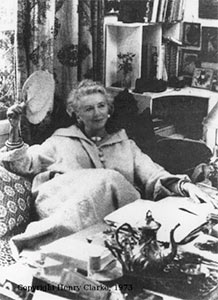
Eccentric and unreliable….
7. More of the same.
In fact Around the World in Eighty Dishes is as eccentric and unreliable as its author. In common with David, Blanch offers her readers recipes that are not much good in terms of instruction. It is possible, even likely, that neither author actually cooked many of the dishes she purports to describe. Their purpose, however, is different. As Boston implies, Blanch (like David, which accounted for her appeal to Austerity Britain) chooses to evoke an exotic impression rather than provide guidance. If, however, the dishes David smears in broad strokes are reasonably authentic, all but a handful of the ones from Blanch are fraudulent manifestations of her unreliable imagination.
Blanch lifted some of her recipes from the work of Countess Morphy, many of them from Recipes of All Nations. (Boston) Morphy was a bestselling author in Britain during the 1930s, and her recipes are not particularly good--or authentic--either. On that score and another, it is fitting that Blanch cribbed from her, for the ‘countess’ was a fraud, in fact a commoner from New Orleans who emigrated to England as a girl in mysterious circumstances.
Aspects of Eighty Dishes do have a certain appeal. On liquids, for example:
“Without wishing to urge my readers to alcoholic excesses, I suggest they regard water, as such, with suspicion. It ruins many good foods if not kept firmly in its place--which to my mind is the washing-up bowl.” ( Eighty Dishes 10)
Despite her tendency to pontificate, Blanch refuses to take herself too seriously. She got one recipe, she deadpans, from “the man who has been appointed the first Postmaster at the North Pole, which air travel and jet-propelled planes now bring very close.” And it is endearing that she refers to summer pudding by its largely forgotten old name of ‘fruit hat.’ ( Eighty Dishes 157, 34)
An anchovy and egg sauce for spaghetti that Blanch claims to have found in Naples is plausible enough, and she does describe an authentic risotto consisting of Arborio, onion, parmesan, optional ham or mushrooms and not much more.
Her “Eel Soup (from Holland)” is satisfactory, seasoned as it is with capers, lemon, mace and parsley, but sounds a lot more British than Dutch. In addition it is difficult to credit Blanch’s notion that “[e]el is the hot-dog of Holland. Everybody eats and loves it.” ( Eighty Dishes 36) And where, other than the United States, it is fair to ask, does ‘everyone’ eat hot dogs?
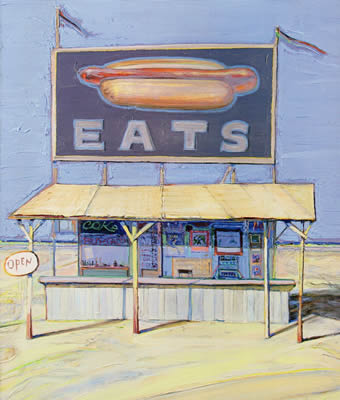
The recipe for “Portuguese eggs” is superb, but does not appear in any Portuguese source. Instead, it is a traditional English recipe for coddled eggs in which an emptied tomato half substitutes for the ceramic coddler ordinarily employed. Onion stuffed with kidney is an eighteenth century standby from English seaports, but does not exist, as Blanch would claim, in any source out of Bucharest or anywhere else in Romania.
8. Trouble in parts unknown.
Otherwise the recipes are mostly ridiculous, even revolting at times. For someone so obviously steeped in the English tradition, Blanch equally obviously had neither cooked a steak and kidney pudding nor bothered to look up how the job is done before writing Eighty Dishes . Her ghastly recipe calls only for steak, kidney and water; no onion nor mushroom nor oyster nor anything else.
Blanch does not really care about the verisimilitude of what she writes: The atmospherics matter more than accuracy or even logic. “The Hungarians,” she explains in the introduction to her recipe for goulash, “love very highly flavoured foods, with lots of fiery red peppers and paprika.” Blanch then proceeds to produce a recipe that specifies the merest teaspoon of paprika and omits ‘fiery red peppers’ altogether. What passes for goulash from her, and it will withstand only the most slovenly scrutiny, also includes a couple of incongruous ingredients in barley and prunes. ( Eighty Dishes ) Blanch tosses prunes, raisins and other dried fruit into all kinds of other dishes where they do not belong either.
Her ‘Haitian’ creation is “The Zombie’s Secret” of avocado, banana, cinnamon, coconut, coffee, cream, cream cheese and sugar is as Haitian as it is Inuit, not to mention the offensive name and origin myth Blanch ascribes to it, which anyway she trusts her reader will discern is untrue:
“It is said to have been made best by a poor slave, who having died, became a Zombie and was therefore kept making it for everyone, day after day…. (and I must admit I should like to have one in my kitchen, here and now.)” ( Eighty Dishes 152)
Nor, despite her insinuation, does it appear that Blanch ever entered Haiti. The “sinister undertone” of voodoo drums, dancing and singing, she intones, “goes on all night” while “[t]he people,” she continues, “talk a graceful, old-fashioned French, dating perhaps, from the time of French occupation in the eighteenth century.” (Blanch 151) They do not: Haitians speak Creole, a language incomprehensible and harsh to French ears.
Blanch declines to spare the Inuit either, whom she awards an inauthentic drink of coffee, gulls’ eggs and sugar. Chop Suey, invented in the United States, she ascribes to China despite describing it as “Honourable Stranger’s;” she has Indians put curry powder, created by the British, in their rice (no, although Blanch herself puts in a number of places it should not go); while “Saint’s Sauce” with its distinctively unique English ingredients including pickled walnuts and watercress comes, she claims, from Guatemala, even though pickled walnuts appear to have no presence in the cuisine of the country.
Although Shusha Guppy, who interviewed Blanch for a book, describes her as an accomplished cook, it is tempting to wonder based on Eighty Dishes whether she cooked anything at all. She eschews, for example, olive oil, “finding the taste too heavy,” but claims to prefer the bludgeon of assertive peanut oil as “tasteless and light.” ( Eighty Dishes 15)
Despite the sparkles, Eighty Dishes is more irritant than illuminant or amusement. The heavy humor and ridiculous recipes render it tough to take.
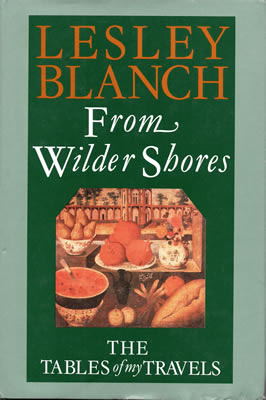
9. A sequel, seldom satisfactory, may surprise us.
Blanch returned to the topic of food with From Wilder Shores: The Tables of my Travels. She published it thirty-three years after Eighty Dishes , aged eighty-five, although some of the essays had appeared previously in various periodicals. Based on the earlier book and its title, an obvious attempt to mine the popularity of her first, and best-selling, work, it would be fair not to expect much from Blanch with the second Wilder Shores. Compounding the skepticism, her second book on food spills a lot of ink on exotic locales and cuisines like the first.
The premonition did not prove prophetic; the only similarity between the two books is the broad choice of topic. If Eighty Dishes was forced and foolish, From Wilder Shores is a whimsical delight. It turns out that at least in later years Blanch could in fact cook: The recipes in the later book are as good as the ones in the earlier effort bad. Yet while Eighty Dishes has enjoyed a certain vogue--it was reprinted in 2012 and receives repeated reference from culinary columnists--the better book remains forgotten.
“Perhaps,” as Blanch muses in its “forward,” From Wilder Shores “could be best described as a sketch book: sketches offering the dishes, places and people I have encountered on the move through life,” written to cheer herself while confined to a wheelchair after serious injury. It is, however, devoid of bitterness or regret aimed at Gary, Seberg or anyone else, and as Blanch insists “no more than glancingly autobiographical,” intended instead to give her reader “ideas, outlines and echoes of delicious faraway feasts on Wilder Shores” and, actually, back in Britain. ( Wilder Shores 1, 2)
“Meals on Wheels” sketches railroad dining cars, including the dining cars on the Train Bleu from Paris to the Cote d’Azur, the Orient Express and the Trans-Siberian Railway. Blanch also describes a pair of shorter, overnight, journeys taken as a child “where food was taken seriously, with a fervent sense of national pride.” These lines? From London, The Flying Scotsman to Edinburgh and the Royal Highlander to Inverness, serving “all-glorious, traditional Scottish fare.”
At dinner the railway “offered the sort of thing no child could ignore--Crowdie-Mowdie, Skink, or even once, blazed into memory, Rumbledethumps.” All this was good, but breakfast reached “a fortissimo with porridge, Finnan Haddock, herrings fried in oatmeal, bannocks, baps, drop scones and Dundee marmalade. To the Scots,” Blanch explains, “this is the food of their forebears. To others,” she concludes, “quite simply a treat.” ( Wilder Shores 25)
10. Scotland and England and actors oh my.
She was born in 1904, so probably took these trips before the First World War; the menus on Scottish trains still wore a tartan border. Her deft description of the atmosphere she encountered manages a difficult double, to evoke at once a lost time and class as well as encapsulate in a couple of lines the more timeless Scots character.
“The restaurant car was always crammed with archetypal, laird-like tweedy figures, often kilted, all eating with immense gusto. There was nothing of the ‘dour’ Scot about them; they were affable, but there was a firmly chauvinistic air of superiority that hedged them round. One was aware that England was a long way away: one was abroad, among foreigners: but how one was enjoying that foreign food.” ( Wilder Shores 25-26)
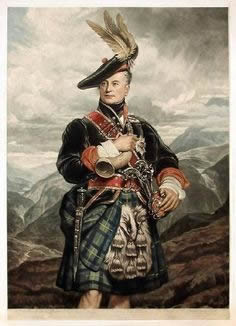
A shorter note “In Praise of Puddings” continues to turn good phrases. “Puddings,” Blanch thinks, “have nice names, and nice faces too, like most cakes.” The variety of English puddings
“can challenge the galaxy of curries and spiced dishes of the Eastern table. Puddings should be considered part of our cultural heritage, a sacred trust, for which some affiliation with the National Trust might even be envisaged.” ( Wilder Shores 19)
Despite her travels, her cosmopolitan, celebrity and socialite friends, her affectations and deceits, it is impossible to accuse Blanch of snobbery when the subject is food. “Grand Food, Good Food and Grub” does drop names--Fred Astaire and Cole Porter, among many others as we have seen--but only in a disarming way. “If,” she asks, “I have appeared to be name-dropping, what else can I do? Were I to write: ‘Dinner with C.P. and F.A.’”, even such food as the grand caviar, pheasant and soufflé they served “would lose some of its lustre.” ( Wilder Shores 90-91)
Caviar and pheasant are doubtless grand, especially served “in the grandest company,” but Blanch concedes that “[t]o define the exact category into which the different dishes fall is tricky.” Much depends on context too. Rack of lamb with mint sauce is grand enough, “yet Alexander Dumas’ gigot de sept heures is probably considered far more grand, by its reputation, if not its complication.” ( Wilder Shores 85)
11. In the end there was England, even in exile.
None of it, the celebrities, the grande salons, the caviar and truffles, matters much to Blanch in old age. In the end she peels off her persona of cosmopolitan superiority. It would be better, she admits, to “get back to nameless company and grub--the best sort--which is, essentially, ever my choice, to be sought out with the zeal of a truffle hunter.” By her lights grub “is traditional English food and for all my life of travel, of pilafs, kebabs and fricassees, I love best suet pud., bangers and toad-in-the-hole…. ” ( Wilder Shores 91; ellipses in original)
“Grand food,” she decides, “is not always good, nor is good food necessarily grand, while grub, so-called, the sausage and mash, jellied eel, shepherd’s pie or pork pie plenty as once found in pubs, remains to me, at any rate, hors category--simply delicious.” ( Wilder Shores 85) Not that she could forget the “historic grandeur” of Byzantine cuisine nor revel in the species of homely exotica still found in Soho Square, a good place to take our leave.
“When I return occasionally to London, and sight one of those small chalet-like green structures, the cab-man’s shelter (unique, I believe, to London streets), I stand transfixed, sniffing the heady wafts of boiled beef and cabbage or Irish stew and dumplings simmering within, hot and plentiful, awaiting the fortunate taxi-man and his appetite.” ( Wilder Shores 91)
She had traveled far from Zombie’s Delight over the preceding decades.
Notes:
-Crowdie-Mowdie is oatmeal steamed in buttermilk or water, traditionally eaten at breakfast.
-Skink is a Scots term for shin or hough of beef, and by inference the soup made from the cuts. Hough in turn is a scots term for hock.
-Rumbledethumps are transporting, and taste considerably better than the sum of their very good ingredients of cabbage, onion and potato. They often are laced with chives or scallion greens and topped with molten cheese. Our recipe appears in the practical.
Sources:
Anon., “Lesley Blanch,” www.lesleyblanch.com/lesleyblog1.html (accessed 28 July 2016)
Lesley Blanch, From Wilder Shores: The Tables of my Travels (London 1989)
Round the World in Eighty Dishes: The World Through the Kitchen Window (orig. publ. London 1956; London 2012); citations are to the 2012 edition.
Anne Boston, Lesley Blanch: Inner Landscape (London 2014)
Tara Isabella Burton, “The Countries We Think We See,” The Paris Review (8 January 2016)
Rachel Cooke, “The cookbook that reads like a Tintin adventure,” The Guardian (8 December 2012)
Margalit Fox, “Lesley Blanch, 102, a Writer and Traveler, Dies,” The New York Times (11 May 2007)
Shusha Guppy, Looking Back: A Panoramic View of a Literary Age by the Grandes Dames of European Letters (Latham NY 1991)
Michael Leapman, “Anne Scott-James: Journalist who breached Fleet Street’s gender barrier and later became a gardening expert,” The Independent (17 May 2009)
Caroline Moorehead, “Caroline Moorehead on the Exemplary Life of Lesley Blanch,” www.truthdig.com/arts_culture/caroline_moorehead_on_the_exemplary_life_of_lesley_blanch_20100730 (accessed 28 July 2016)
Alice Wooledge Salmon, “Lesley Blanch, Grand and eccentric writer who charted her worldwide adventures in travel and cookery books, and a single literary classic,” The Guardian (10 May 2007)
Philip Ziegler, “Lesley Blanch: a true original on the wilder shores of exoticism,” The Spectator (28 March 2015)

